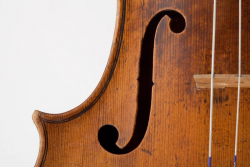
Not Just a Big Violin Anymore!

Research developments in 19th century Viola pedagogy and performance practices
The greater independence and emergence of the viola in the 19th century led to a flourishing of instructional material from composers and performers, who had previously never supplied music specifically written to teach the viola. As composers began to demand more of the violist in this period, particularly in chamber music, composer-performers supplied pedagogical works which could properly teach a violist to play their instrument independent of concurrent schools of violinist training. Much of this music was written for violinists learning to play the viola, and often was written in the form of duos for viola and violin or two violas. This music occupied a special place: for the first time, there was music written especially for the viola meant to show and teach its unique qualities, free of its relation to the violin.
The purpose of this lecture recital is to demonstrate recent research into the pedagogy of the viola in the 19th century. This research will illustrate what the teaching of the viola in the 19th century can show us today about the values of musicians and teachers of the 19th century, as well as provide insight into select performance practices of violists of this period. Performers and teachers of historically informed practices can use these ideas to gain greater insight into viola playing in the 19th century, as well as to attain new perspectives on the attitudes of 19th century musicians in general, in order to further our growth and understanding of 19th century HIP.
Also featuring: Romaric Pokorny, historical violas, and Corentin Pokorny, historical violin
Musical selections to include:
Bernhard Brähmig (1822-1872): excerpts from Practische Bratschenschule (1869)
Michel Corrette (1707-1795): Two Minuets from Methodes pour apprendre a jouer de la Contre-Basse, de la Quinte ou Alto, et de la Viole d'Orphee (1773)
Michel Joseph Gebauer (1763-1812): excerpts from Méthode d’alto (ca.1805)
Ferdinando Giorgetti (1796-1867): excerpts from Metodo per esercitarsi a ben suonare l'Alto-Viola (ca.1854)
Otto Langey (1851-1922): excerpts from Celebrated Tutor for Viola (1891)
Edmund Kupfer (fl.1850-1910): excerpts from 21 Übungstücke für Viola alta (1890)
Alessandro Rolla (1757-1841): Giro Armonico per Viola con Accompagnamento d’un Violino, Op. posth., BI 315
Rolla: Arpeggio Per Viola e Violino in E-flat major, BI 7
Rolla: Allegro Maestoso from Sonata for Viola with Violin Accompaniment in E-flat major, BI 65 (1824)

Violist Vijay Chalasani is a Seattle-based performer, scholar, and teaching-artist whose work focuses on the performance practice of music of the last five centuries. Equally at home on both modern and historical violas, Chalasani was featured as a soloist in performances ranging from the Walton Viola Concerto, Mozart Sinfonia Concertante, and Hoffmeister Viola Concerto with modern orchestras, to Bach’s 6th Brandenburg concerto, the Telemann Viola Concerto, and the Telemann Concerto for Two Violettas with period orchestras. An avid advocate for contemporary music, Chalasani was the soloist in the US premiere of Vinko Globokar’s chamber-theater piece “Blinde Zeit” with members of the Callithumpian Consort, supervised by the composer. He has also performed with violist-composer Garth Knox, pianist-conductor Stephen Drury, and the Inverted Space Ensemble, coached with composer Brian Ferneyhough (on his “Adagissimo” for string quartet), and has collaborated with the Guerrilla Composers Guild and others to actively commission new works for the viola. Chalasani performs frequently on period instruments with ensembles such as the American Bach Soloists, Pacific MusicWorks, Early Music Vancouver, and the Albany Consort, as well as in chamber music performances of works from the classical and romantic eras on historical instruments.
Chalasani currently studies in the Doctor of Musical Arts program at the University of Washington, where he studies viola with Melia Watras; as a Teaching Assistant at the UW, he works with the Modern Music Ensemble and Baroque Ensemble, and teaches Chamber Music Lab and String Techniques. Chalasani’s graduate studies were at the San Francisco Conservatory of Music, where he studied with Don Ehrlich (modern viola), Elizabeth Blumenstock (baroque viola), and the late Mark Sokol (chamber music). His undergraduate studies were at CSU Sacramento, where he studied viola with Anna Kruger, chamber music with Ian Swensen and Andrew Luchansky, and pedagogy with Judy Bossuat. In addition to the concert stage, Chalasani often performs in less traditional venues such as bars, cafes, and house concerts, and has appeared in cross-genre performances with a wide range of artists including rock band Third Eye Blind, hip-hop orchestra Jazz Mafia, and indie-folk group Americana Orchestra.